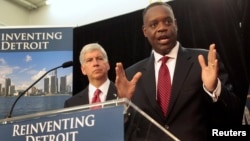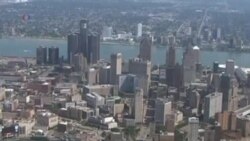By filing for bankruptcy, debt-ridden Detroit is buying itself some time to fix its finances, but it also is giving up financial control of its government and handing it to a federal judge.
Law professor Peter Henning at Wayne State University in Michigan said the judge, not the city's elected officials, will be making important decisions about the city's future.
"Really, what it is, it's a watershed moment because no longer is it just the emergency manager and the various constituencies in the city. Now it's under the power of the federal judge, and so the decision-making is really out of the control of the people who had a say in the process before," Henning said. "Now what you're talking about is a federal bankruptcy judge deciding who's going to get paid and how much they're going to get paid."
Watch related video by Mil Arcega:
Detroit calls itself the Motor City, the home of the American auto industry. But as Americans fell in love with foreign auto imports from Japan and Germany over the last 30 years, Detroit declined. Its population plummeted over several decades and many of its neighborhoods collapsed in decay and abandonment.
As the city's influence as an industrial center waned over the last half century, its elected officials mismanaged the local government, with one of its mayors sent to prison in a sex scandal. Now the city's debt stands at $18 billion or more.
A business and law professor at the University of Michigan, Erik Gordon, told VOA that the city is now paying for its misdeeds. "We had a mayor who was sent to jail, was sent back to jail. We had a city council that for many years was composed mostly of clowns," he noted. "We had a city that was living in fantasyland and that catches up with you. And it caught up with Detroit."
He said American automakers totally misread the allure of foreign-made cars, which over time diminished the city's standing as a symbol of American industrial muscle.
"I can remember when the first cars came over from Japan, and the Detroit automakers and the people in Detroit called those cars rice runners and said nobody will ever buy them," explained Gordon. "You know, times change and you have to face up and you have to compete. Detroit during the best of times got sort of fat and lazy and that's how you fall behind."
The Michigan academic said that by filing bankruptcy, the city will gain time to reassess its finances, although many creditors are unlikely to be paid anything close to what they are owed.
"The idea behind bankruptcy in America is a fresh start. So if you have a city or a company that you think is viable, that you think could go forward if only you get a little bit of a fresh start, you go into bankruptcy with a court-supervised procedure, actually specialized courts, bankruptcy courts, that act as referee, with special powers to get things settled, including some interesting powers to tell debtors that you may be owed $100, but you're only going to get $10," said Gordon.
He said he expects that Detroit will eventually emerge from bankruptcy as a renewed city focusing on the growth of technology businesses and less on its industrial past.
Law professor Peter Henning at Wayne State University in Michigan said the judge, not the city's elected officials, will be making important decisions about the city's future.
"Really, what it is, it's a watershed moment because no longer is it just the emergency manager and the various constituencies in the city. Now it's under the power of the federal judge, and so the decision-making is really out of the control of the people who had a say in the process before," Henning said. "Now what you're talking about is a federal bankruptcy judge deciding who's going to get paid and how much they're going to get paid."
Watch related video by Mil Arcega:
Detroit calls itself the Motor City, the home of the American auto industry. But as Americans fell in love with foreign auto imports from Japan and Germany over the last 30 years, Detroit declined. Its population plummeted over several decades and many of its neighborhoods collapsed in decay and abandonment.
As the city's influence as an industrial center waned over the last half century, its elected officials mismanaged the local government, with one of its mayors sent to prison in a sex scandal. Now the city's debt stands at $18 billion or more.
A business and law professor at the University of Michigan, Erik Gordon, told VOA that the city is now paying for its misdeeds. "We had a mayor who was sent to jail, was sent back to jail. We had a city council that for many years was composed mostly of clowns," he noted. "We had a city that was living in fantasyland and that catches up with you. And it caught up with Detroit."
He said American automakers totally misread the allure of foreign-made cars, which over time diminished the city's standing as a symbol of American industrial muscle.
"I can remember when the first cars came over from Japan, and the Detroit automakers and the people in Detroit called those cars rice runners and said nobody will ever buy them," explained Gordon. "You know, times change and you have to face up and you have to compete. Detroit during the best of times got sort of fat and lazy and that's how you fall behind."
The Michigan academic said that by filing bankruptcy, the city will gain time to reassess its finances, although many creditors are unlikely to be paid anything close to what they are owed.
"The idea behind bankruptcy in America is a fresh start. So if you have a city or a company that you think is viable, that you think could go forward if only you get a little bit of a fresh start, you go into bankruptcy with a court-supervised procedure, actually specialized courts, bankruptcy courts, that act as referee, with special powers to get things settled, including some interesting powers to tell debtors that you may be owed $100, but you're only going to get $10," said Gordon.
He said he expects that Detroit will eventually emerge from bankruptcy as a renewed city focusing on the growth of technology businesses and less on its industrial past.







